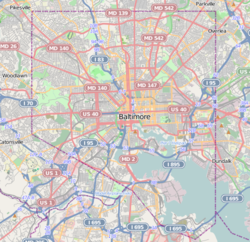Belvedere Hotel
|
The Belvedere
|
|

Belvedere Condominiums, July 2005, (former Hotel Belvedere)
|
|
| Location | 1 East Chase Street, (off North Charles Street), Baltimore, Maryland |
|---|---|
| Coordinates | 39°18′8″N 76°36′58″W / 39.30222°N 76.61611°WCoordinates: 39°18′8″N 76°36′58″W / 39.30222°N 76.61611°W |
| Area | 0.1 acres (0.040 ha) |
| Built | 1902-1903 |
| Architect | Parker & Thomas; W.A. & E.A. Wells |
| Architectural style | Beaux Arts |
| NRHP Reference # | |
| Added to NRHP | August 29, 1977 |
The Belvedere is a Beaux Arts style building in Baltimore, Maryland. Designed by the Boston architectural firm of Thomas and Parker and built in 1902-1903, the Belvedere is a Baltimore landmark at the southeast corner of North Charles Street, facing north on East Chase Street in the city's fashionable Mount Vernon-Belvedere-Mount Royal neighborhood. In 1991 it was converted into condominiums, though areas remain open to the public.
The eleven-story tan brick building rises 118 feet (36 m) from a rusticated stone base to an elaborately-detailed "French Second Empire" styled crown with a traditional mansard roofline.
The hotel is named for its site on the former "Belvidere" estate of American Revolutionary War military leader/hero, a later civic and city leader, Colonel John Eager Howard, (1752-1827), of the famous "Maryland Line" regiment of the Continental Army which distinguished itself especially at the Battle of Long Island/Battle of Brooklyn outside New York in August 1776 and the Battle of Cowpens in South Carolina in 1780. Howard's lands north and west of old Baltimore Town, known as "Howard's Woods" were eventually used to donate plots for several churches and civic sites including the landmark Washington Monument and the four park-like squares surrounding it, when constructed 1815-1827, along with the old Baltimore Cathedral (now the Basilica of the National Shrine of the Assumption of the Blessed Virgin Mary), built 1806-1821, by the famed British-American architect, Benjamin Henry Latrobe, (1764-1820), a few blocks southwest on Cathedral Street. Later Howard children and members of the family sub-divided the grand estate beginning in the late 1820s into the 1830s and 1840s for rows of elegant townhouses (and later cultural institutions) extending northward from the harbor-front city, eventually surrounding the old historic mansion situated at the intersection of North Calvert and East Chase Streets until it too was finally razed in the mid 1870s.
...
Wikipedia



